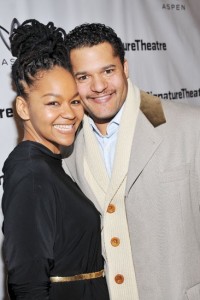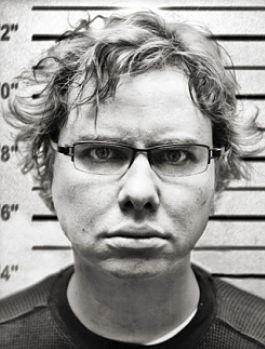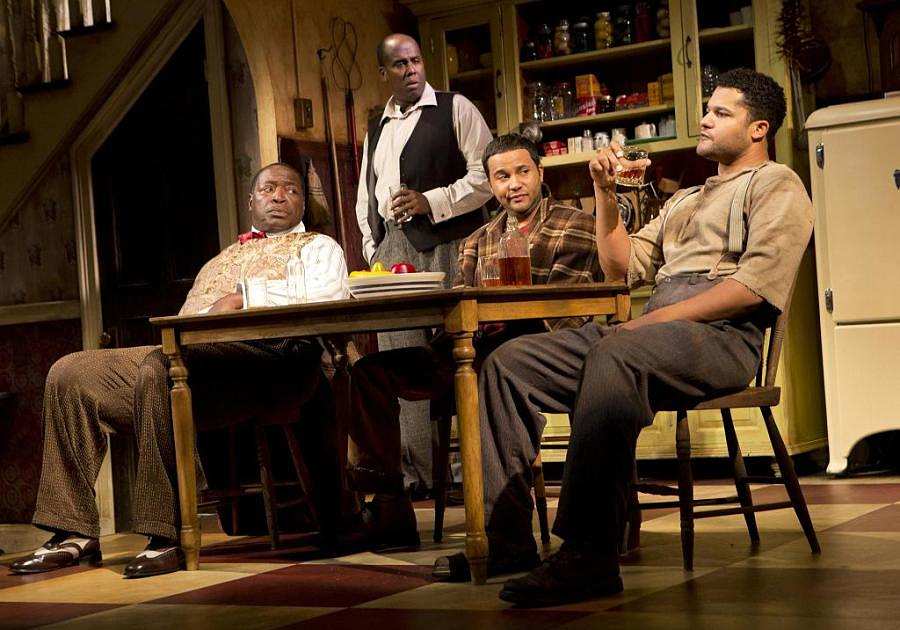Brandon Dirden was cast in his first August Wilson play around the age of 11, as Reuben in Joe Turner’s Come and Gone at the Alley Theatre in his native Houston, and it’s fair to say it changed his life; he’s since appeared in half the Wilson canon and recently made his directing debut at the helm of Seven Guitars at Two River Theater in Red Bank, N.J. In a conversation with me last week before theatre students at the University of Illinois Urbana-Champaign, where Dirden got his MFA, he fondly recalled the director of that Joe Turner, Claude Purdy—a longtime Wilson comrade who’d encouraged his poet friend to try writing for the stage—and in particular the joy and sense of community that Purdy brought to the room. A sense of ensemble camaraderie, Dirden said, is also central to the approach of director Ruben Santiago-Hudson, who helmed Dirden in his Obie-winning turn in the Signature Theatre’s 2012 revival of The Piano Lesson.

Family feeling seems to come naturally to Dirden, who caught the theatre bug from his father, a community-theatre actor in Houston, and whose younger brother, Jason Dirden, is also an actor, as is his wife, Crystal Dickinson (the original and Broadway cast of Clybourne Park). The three of them, he said, even bombarded New York casting directors with matching postcards when all three made their Off-Broadway debut in Leslie Lee’s The First Breeze of Summer, under Santiago-Hudson’s direction, as part of Signature’s Negro Ensemble Company season in 2008. Jason appeared with Brandon in Signature’s Piano Lesson, as well as in a memorable Two River production of Topdog/Underdog directed by the play’s author, Suzan-Lori Parks (Dickinson told me she has hopes for that production turning up again somewhere soon).
Dirden may now be best known to theatregoers for playing Dr. Martin Luther King Jr. in Broadway’s All the Way (and to TV watchers for his recurring role on “The Americans”), and he spoke to Illinois students from an early-mid-career place where he no longer has to struggle to pay his bills but instead must figure out, minus youthful hunger, what will drive him to his next creative challenge. Though there’s not yet a recording available of the interview, one student, Kyle A. Thomas, live-tweeted our chat, and you can find some gems here. One particular favorite, for the actor’s advice file: “The audition should never be the first time you’ve said those words aloud to someone else.” Another insight, after having played Othello twice—Dirden has heard the conventional wisdom that one must play it thrice to really nail it—is that “too often playing Shakespeare is about being understood, not being ‘in want.’”
It was a great conversation, in short, with a fascinating actor who’s shown us much and has much more to show—if nothing else, in works by the playwright who gave him his legit start. As he pointed out, he began in the youngest male role available in a Wilson play, and he looks forward to moving through many other roles in the playwright’s work. As Wilson once told me, “I don’t believe there’s any idea that cannot be contained by black life, or any of the full variety of human experience; I believe that world is capable of sustaining you.” Dirden is hardly the only actor who’s been both inspired and sustained by Wilson’s work, but he’s one of the best.
Cycle Out?
Speaking of recordings not being available, what’s up with the Wilson Century Cycle that was recorded in 2013 at the Greene Space in NYC? The audio of those 10 plays—recorded in many cases with original cast members, or in the case of Piano Lesson, with the 2012 Signature cast—is not available for streaming or download anywhere that I could find. Those original recordings inspired my colleague Isaac Butler to write a probing essay about Wilson’s work and legacy. I imagine they’d inspire reflection and admiration among many others, if only they could be heard.
Mac 2.0

Like his colleague Qui Nguyen, playwright Mac Rogers writes unapologetically sci-fi/fantasy genre work almost exclusively for stages Off-Broadway, off-Off-Broadway, and in various small theatres around the country. It’s a specialized niche, to say the least, and now that Nguyen has mostly moved on to regional theatres (and God bless him for it), Rogers and Gideon Productions, the mom-and-pop theatre company he’s part of, pretty much own it. (His popular “Honeycomb Trilogy” runs in rep through Sat. Nov. 14 at the Gym at Judson.) It’s no putdown to say that while Rogers’s work entirely earns its due onstage—as he explained in a recent essay for us, sci-fi theatre need not be an oxymoron, if all parts of that label are given their full due—it also invites ready comparisons to novels and films and TV shows, to which its plots would readily seem to lend themselves.
It has seemed only a matter of time, in other words, before Rogers’s prodigious yarn-spinning talents would be eagerly snatched up by another medium. We might have assumed it would be by the writing staff of “Doctor Who,” or perhaps an indie film producer with an interest in adapting “Honeycomb,” say (I’ve heard murmurs about the latter for some time now). Instead, in a perfectly pleasant surprise, Rogers has instead stepped off the stage with a mesmerizing new podcast called “The Message,” which is now six episodes in and has me utterly hooked.
It’s coproduced by Slate’s Panoply podcast network and GE, the latter of which provided Rogers with some of his material, while also harking back to the company’s storied tradition of supporting radio theatre. There’s something quite satisfying about hearing Rogers’s work (and, if I can trust my ears, many of his usual actors) in a format that’s both as old as transistors and as new as streaming. Aptly enough, the narrative—about a fraught, dangerous attempt to decode a 70-year-old audio message apparently sent from space—both calls back to classic radio drama and invokes confessional tropes of the best new nonfiction podcasts, like “Serial” (where is Season 2 of that, by the way? Oh, here).
Still, there are only eight episodes, and they’re fairly short. I’m sure I’m not alone in hoping that Rogers—and now that I think of it, other playwrights—get a chance to do more with this burgeoning medium.
Hir at Last
Finally, speaking of podcasts, I was out sick last week when the American Theatre staff recorded its bi-weekly OffScript podcast, but you’d hardly notice my absence. It’s a lively colloquy (and there’s also a prerecorded interview by yours truly with Dean Gladden, managing director of the Alley, about their recent renovation and temporary relocation). One of the more spirited discussions on the ‘cast arises around Taylor Mac’s play Hir, currently at Playwrights Horizons, with the question being whether it departs from the typical white middle-class family drama in its exploration of gender and violence, or whether it’s part of a tradition of family plays as old as the Greeks, just with new 21st-century wrinkles.
I won’t see it till Saturday night, so I can’t weigh in definitively, except to say that I loved it on the page when we published it, and that some of this ground was covered by Isaac Butler’s great essay about the state of the living-room play. Key graf:
If Straight White Men remains firmly in the living room and The Open House seeks to remake it by stripping off its wallpaper, Taylor Mac’s Hir sits somewhere between these two impulses. Mac says he found himself seduced by the living-room play and its characters, despite his efforts to break out of it: “What I was trying to do was write a eulogy for the kitchen-sink drama, as a metaphor for the old world orders that aren’t working anymore….The play just kept wanting to just actually be in the genre that it’s written in.”
Plays want what they want, as do characters. As no less than August Wilson once said, “The more my characters talk, the more I find out about them.” All you’ve got to do is listen.


